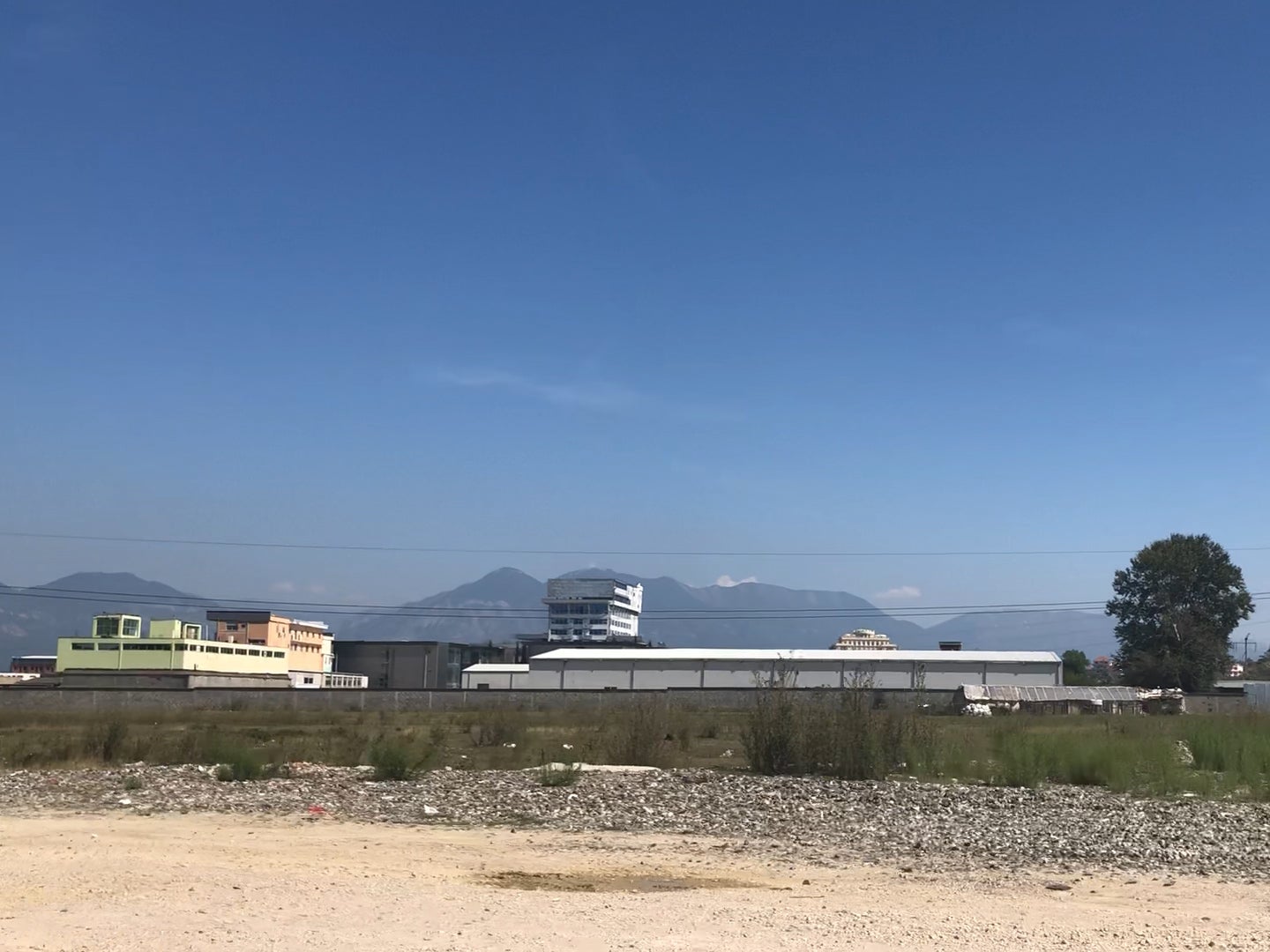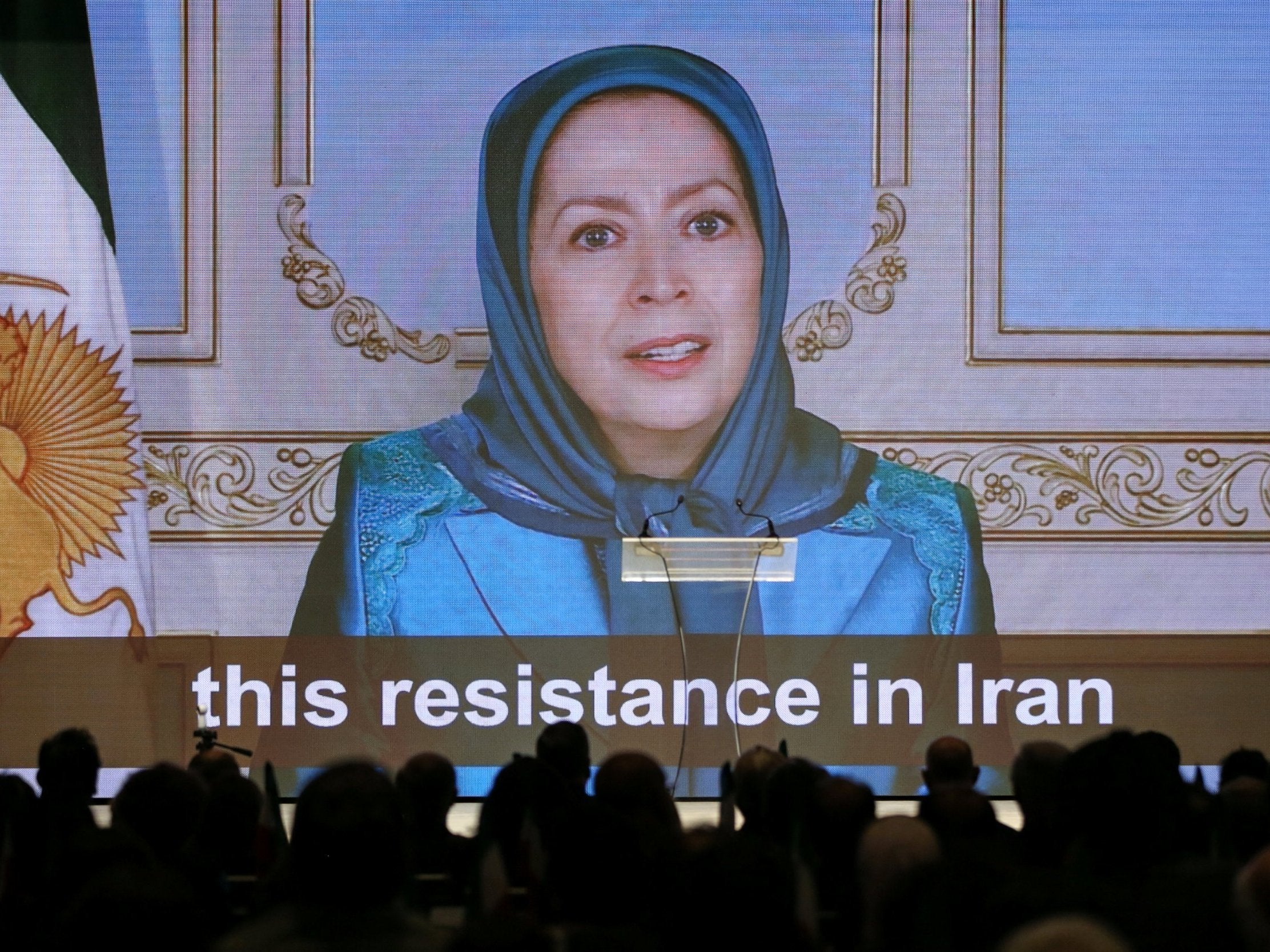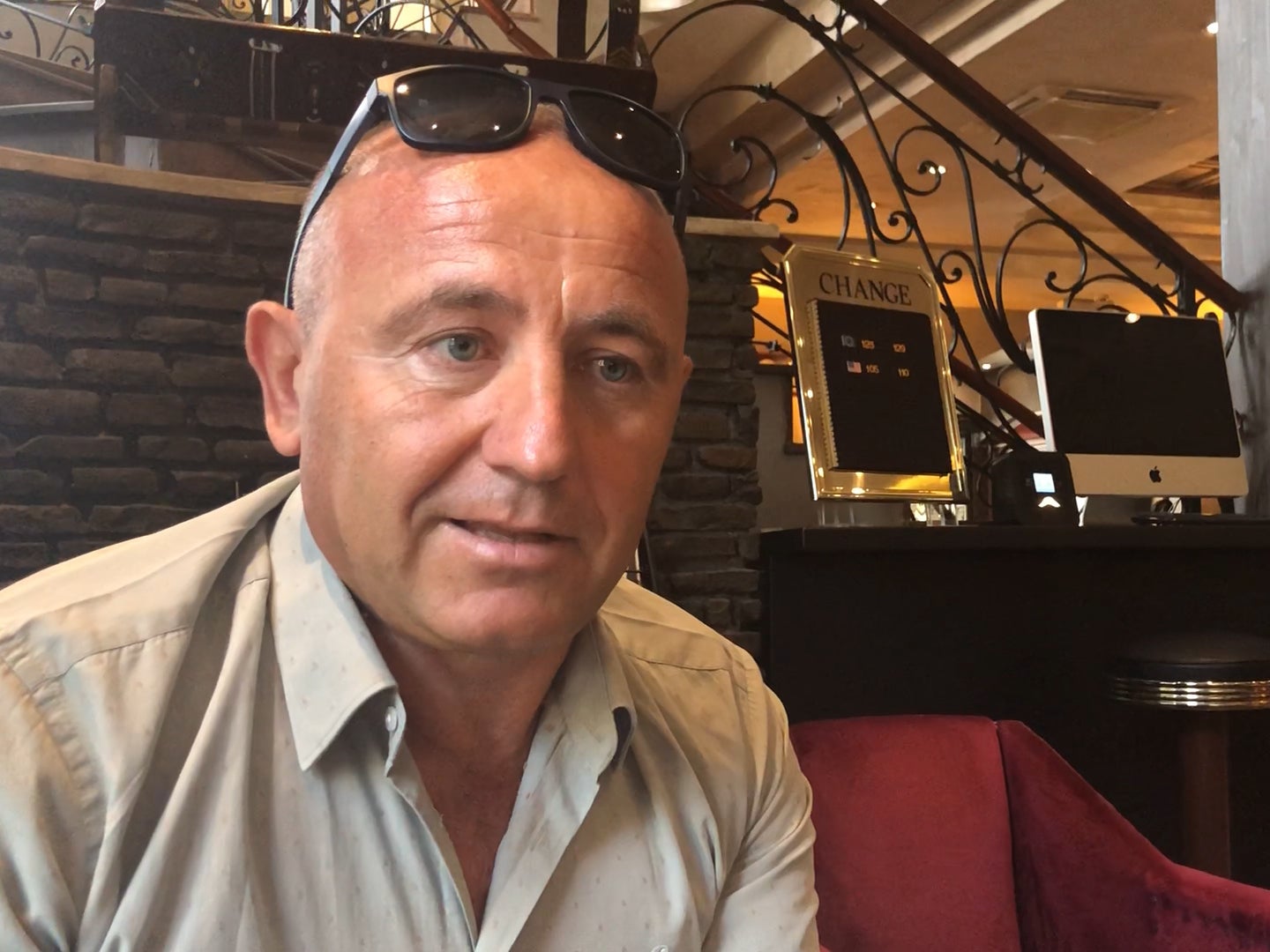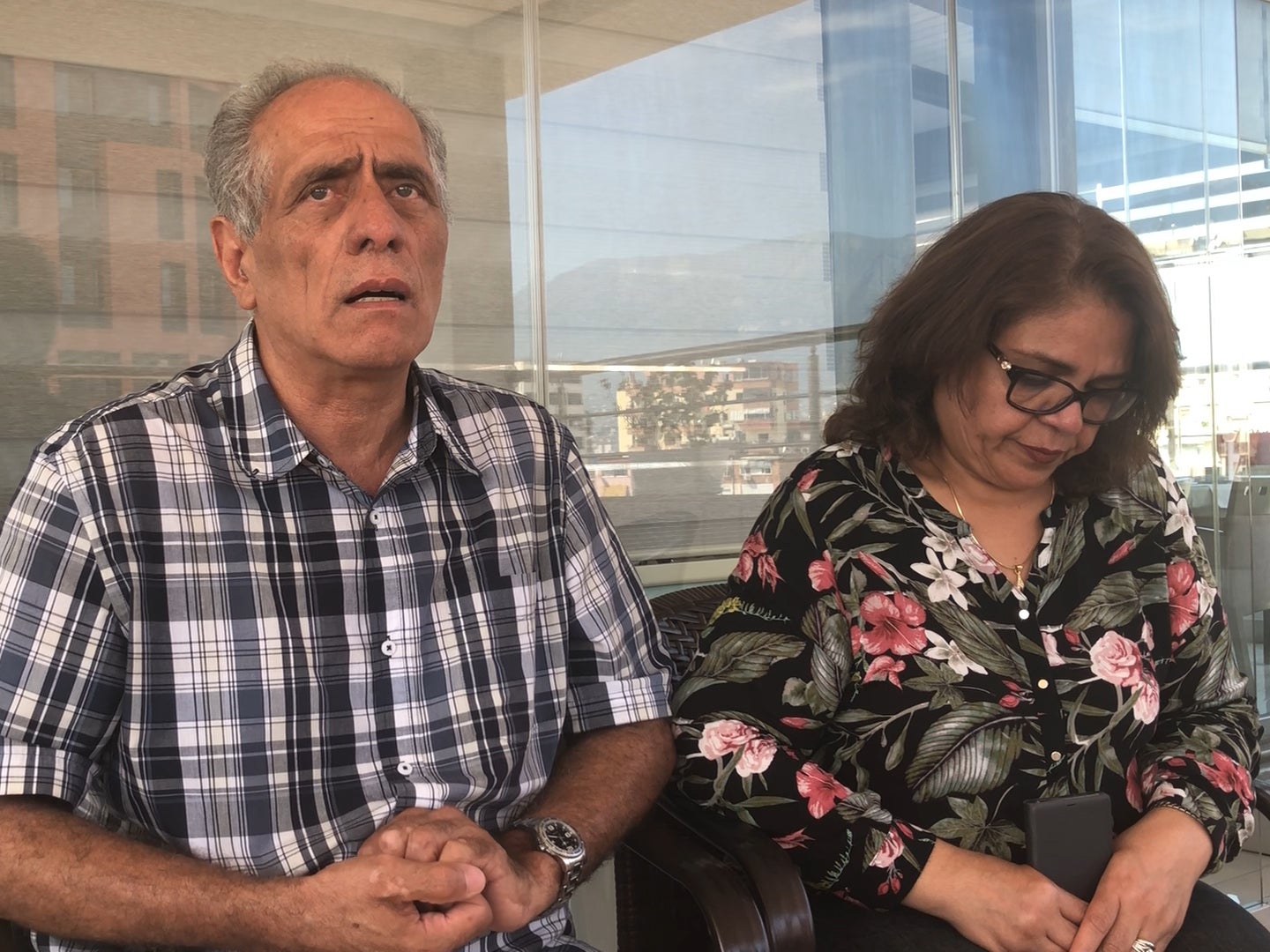The ‘political cult’ opposing the Iranian regime which has created a state within a state in Albania
In Tirana, Borzou Daragahi meets defectors of the People’s Mujahedin Organisation of Iran, a controversial group which has found itself the darling of Washington


An Iranian exile group that is a darling of Washington conservatives has set up what critics describe as “a state within a state” inside the tiny Balkan nation of Albania.
From a well-guarded 84-acre (340,000 square metres, or 34 hectares) property it has forged on a hillside in the Albanian countryside, the group – called the People’s Mujahedin Organisation of Iran, commonly known by the acronym MEK, has begun handing out mysterious wads of cash, set up its own radio communications network, and launched deceptive information operations to influence debate about the Islamic Republic – its avowed enemy – say defectors of the group, relatives of members, and Albanian journalists, lawyers and a former intelligence official.
In addition, it has been accused of locking up members inside the camp against their will, an allegation that has long dogged the organisation, which is led by Iranian exile couple Maryam and Massoud Rajavi, and described by former members and Iran experts as a political cult.
“We are supposed to be living in a free and democratic country. But they have built a state within a state that implements its own laws,” says Olsi Yazici, an Albanian writer who is part of the legal team attempting to find out more about the group.
“They are behaving in Albania like a mafia – breaking laws, blackmailing, paying people off, beating people, threatening defectors, accusing anyone who questions them of being an Iranian agent and controlling their members in the camp through Stalinist totalitarian methods. And at the end, they claim to be democrats who will save Iran.”
The Independent reached out to several MEK spokespersons and representatives, seeking comment for the story.
As this report was being prepared, the organisation released a five and a half minute video clip that showed drone footage of what it called its “residential compound”, which appears made up of dozens of buildings, and a main entrance flanked by a pair of golden lions, a symbol of the MEK.
The video showed Albanians on construction jobs in the camp, as well as members sipping tea with Albanian neighbours, or making music in a studio, including a cover of Frank Sinatra’s “My Way”.
We are supposed to be living in a free and democratic country. But they have built a state within a state that implements its own laws
“Terrorist, terrorist,” the men screamed at the elderly couple, their arms locked, as they sought to walk away. Canadian-Iranians Mostafa and Mahboubeh Mohammadi say they have struggled to get their daughter, Somayeh, out of the MEK for 21 years.
They haven’t spoken to her since 2004, when they travelled to central Iraq to make a desperate attempt to get her and her younger brother out of the camp the group then occupied. Once they had been sympathisers and had even raised money for the group.
“We would spread out on the streets and show pictures of Iranians the regime had killed, and say their kids are stuck in refugee camps,” recalls Mostafa Mohammadi.
But eventually the Mohammadis turned against the group, which they claimed tricked their daughter into travelling to Iraq, seized her passport, and pressed her into the organisation. Through tremendous effort involving US and Canadian diplomats, they say they managed to extract their son, who is now living in Canada, but not their daughter.
The MEK says Somayeh is in the organisation of her own free will, and has issued videos of her disowning her parents.

At least one other former member of the group in Tirana says he was able to leave the organisation once he told them he wished to part ways.
“I choose to pursue my own life,” he says, asking that his name not be published. “There was no pressure to stay.”
A lengthy statement by the group on the website of its front group, the National Council of Resistance of Iran, said that that Mostafa Mohammadi had been in Tehran in 2008 – an allegation he denies – and called Mohammadi’s lawyer an “agent” of the Iranian intelligence services.
The five and a half minute video shows footage of Somayeh Mohammadi with a caption reading that she insists the “Iranian regime deployed her father to accuse MEK (of having) kidnapped her”.
When the Mohammadis first came to Albania to find Somayeh, they were given the runaround by authorities in Tirana, who insisted she was not in the country.
But they managed to get confirmation from a sympathetic local refugee resettlement group that she had arrived in Tirana in 2015. Just days before the confrontation with the MEK members, the Mohammadis managed to prompt a police officer to enter the camp and confirm that she was there, possibly the first time an Albanian official wielding a warrant entered the compound.
“This was a big shock for the MEK,” says Yazici, the writer. “This diminished the role of the commanders in the eyes of the members.”
The Mohammadis had heard that she made her way one day a week to a Tirana hospital, serving as a translator for MEK members seeking medical care. They waited nearby to catch a glimpse of her on 27 July. After a few hours they became discouraged, and began heading back to their hotel.
That’s when a group of four men – who later transpired to be MEK enforcers – surrounded the elderly couple and began screaming “terrorist” at them.
Police soon arrived to break up the melee. Startling the officers, the MEK enforcers continued to strike Mohammadi in front of them, screaming that the frail couple were “terrorists”.
The police rounded up the Mohammadis as well as the MEK enforcers and took everyone to a Tirana police station. MEK leaders summoned their lawyer, Margarita Kola, as well as some leaders of the group. Kola, who once worked as a counsel for the US Embassy in Tirana, claimed she was acting on behalf of the Americans.
“She said, ‘You know who I am or not?’” recalls Migena Banna, the lawyer representing the Mohammadis, who was also at the police station. “She said, ‘I am not just a lawyer, I’m a legal representative of the US embassy.’ Then the police changed their behaviour.”
Kola told The Independent that she did not work for the US embassy but declined to answer whether she had originally made the claim.
Under pressure, police let the MEK members go, but held on to the Mohammadis for eight hours. The Tirana prosecutors’ office told The Independent the case remains under investigation.
Mostafa Mohammadi went to a hospital for treatment for his bruises. By then, the video of the pack of MEK enforcers assaulting the couple had gone viral on Albanian social media. Local television stations arrived to meet the couple, and stories about the search for their daughter began to air. Albanians were outraged.
“We have so many other refugees, Syrians, Iraqis. They can do everything. They go shopping. They are out on the streets,” says Yazici. “Where are these MEK people? Why can’t we see them?”

Much of the world was worried when Donald Trump was elected US president in November 2016. The leaders of the MEK celebrated.
“It was like a wedding,” recalls Hassan Heyrani, a former member of the group’s political committee who defected this year. “It was the whole election of Trump that prompted the group to move forward with the new camp. They were so happy. They said, ‘The geopolitical engine of the region is turning.’”
The story of the 50-year-old group is bound up in the wars, uprisings, and political twists of the Middle East. It was founded by leftist students decades ago to fight against the regime of Iran’s Shah Mohammad Reza Pahlavi, carrying out assassinations of US officials in Iran who were backing him.
It later turned against the clerics who took over in Tehran during the 1979 revolution, staging bomb attacks during the 1980s, when it was granted a camp northeast of Baghdad and joined along Saddam Hussein in the Iran-Iraq war.
That move destroyed its popularity among the vast majority of Iranians. But with dozens of tanks and thousands of fighters positioned at a sprawling and inhospitable desert compound called Camp Ashraf, in a province adjacent to the Iranian border, it remained a threat to the Islamic Republic.
Its fortunes changed after the 2003 US-led invasion of Iraq and toppling of Saddam Hussein. US forces at first bombed the group as an appendage of the Baghdad regime, pulverising many of its tanks. But Washington conservatives later began to cultivate MEK as a potential way of pressuring Tehran.
The group eventually ran afoul of Iranian-backed politicians of the new Iraqi political elite. Members were pressured to leave Camp Ashraf, which was taken over by the Iranian-backed Badr Brigade militia, and relocate to Camp Liberty, on the same compound as US forces and the Baghdad International Airport.
Under pressure by Baghdad authorities to remove the group, the US managed to convince the government of Albania to take in a couple hundred members of the group as refugees in 2013, in what was described as a humanitarian gesture.
But as they came under attack by Iranian-backed Shia militias, as well as pressure by Isis militants, the plan to move a few hundred to Albania somehow turned into bringing the entire organisation from Iraq to southeastern Europe.
Once they had fully moved to Albania, the group first took up residence in a series of empty apartment buildings scattered around the city, and continued its fade into obscurity and irrelevance.
Leaders tried in vain to keep long-isolated members – curious about the modern world, and barred from sex and dating –from drifting away. They tried to erect barriers around one apartment building, but they were promptly torn down by angry local authorities.

With Mr Trump’s election, everything changed. The MEK had spent years cultivating Washington figures such as John Bolton and Rudy Giuliani, who were forces in the new administration in Washington.
In addition, an ambitious and stridently anti-Iran Crown Prince Mohammad bin Salman took the reins in Saudi Arabia, and began looking for allies in his aim to roll back and possibly topple the clerical government in Tehran.
Beginning in July 2017, just as Trump began re-imposing sanctions on Iran that Obama had lifted as part of the nuclear deal, the MEK suddenly began buying plots of land in Albania, in a rural stretch of farmland near the town of Manza, between the Albanian capital and the Adriatic Sea.
The Trump administration continues to maintain strong ties with the MEK. At the weekend, the president’s lawyer addressed a gathering of the group at a midtown Manhattan hotel, describing the MEK as an antidote to the brutality and repression of the “outlaws and murderers” in power in Tehran. “Iran is entitled to freedom and democracy,” he said.
Albanian investigative journalist Gjergi Thanasi said the group paid $13m (£9.9m) to buy the first 200,000 square metres of the compound, has since bought another 140,000 square metres, and continues buying up property and racking up significant water, electricity, and internet bills.
They pay in cash. They buy small things in shops or even in malls. They always pay in cash. They do not use bank cards. They love not leaving a footprint
They pay for everything with huge wads of cash, sometimes piles of local currency that they purchase through street vendors rather than banks or exchange shops, but also with “crisp hundred-dollar bills”, says Thanasi, leaving no bank trail.
“They pay bills on time,” he says. “They pay in cash. They buy small things in shops or even in malls. They always pay in cash. They do not use bank cards. They love not leaving a footprint.”
Thanasi found the group purchased 1,700 Lenovo brand computers and monitors from an Albanian firm. At first he thought it was some scam to evade import duties and resell the computers at a profit. But the MEK paid full price for the devices. They wanted the computers for the camp, and paid for them in cash. “What the hell do you need so many computers for?” he quips.
The group has a number of big-ticket expenses. It has set up a dedicated high-speed internet. It also managed to obtain official permission to set up its own antenna atop Mount Dajti, on the peaks overlooking Tirana, giving it effectively its own communications network.
A private Albanian security firm, called Argon, guard the camp and its entrances, deploying perhaps nine personnel armed with assault rifles and handguns in six-hour shifts around the clock.
It remains unclear why Albania, a small Balkan country struggling to overcome its reputation for corruption and money laundering in order to become a member of the EU, would allow such a shadowy group to operate with so little scrutiny.
“If I want to buy a car for 2,000 or 3,000 euros I have to use a bank in order to pay for the car,” says Thanasi. “I have to circulate the money through the bank and justify that this quantity comes out of my personal savings.”
The organisation appears to have strong connections to senior Albanian officials. Pandeli Majko, a minister in the current Albanian government of Prime Minister Edi Rama, Fatmir Mediu, a former defence minister, and Elona Gjebrea, a former deputy interior minister, were with Giuliani when he visited Tirana earlier this year for Persian New Year festivities hosted by the MEK.
Heyrani, the 38-year-old former member of the MEK’s political section, says he suspected the group’s sudden riches were coming from Saudi Arabia’s coffers, through a channel organised by Saudi prince Turki al-Faisal, who over the summer, attended an MEK rally in France, along with Giuliani, Trump’s lawyer, and Bolton, the White House National Security Adviser.
Heyrani says he had no evidence of Saudi support for the group other than conversations with members of its political leadership. “I said, ‘What a big camp, with so many buildings,’” Heyrani recalls. “He said, ‘Finally, Faisal laid the golden egg.’”
A spokesperson for the the Saudi embassy in Washington did not respond to a request for comment. Ali Shihabi, founder of the Riyadh-backed Arabia Foundation think tank, said that Prince Turki has denied serving as a conduit for MEK funds.
Hassan Shahbaz, 50 years old, had joined the MEK shortly after the US invasion of Iraq. But it wasn’t until he got to Tirana that he discovered that his elderly mother, two brothers, and two sisters had risked their lives to travel to Iraq in the midst of that country’s 2006 civil war to visit him. When they arrived they were turned away from the camp entrance. “They told them I wasn’t there, and turned them back,” he says today.
When he confronted MEK superiors about their action, they told him to let it go. “For now, freeze it,” he was told.
A few weeks later, during an outing with other MEK members in April, he quietly slipped away from the group, took a taxi back to Tirana and became one of the growing members of the group to defect.
“Back then when they kept us locked up, they could say it’s for our own protection, that the government of Iraq is in the pocket of Iran,” he says. “What’s the argument here?”
Sheltered inside the camp, which members nickname Ashraf 3, the organisation has recreated what critics call its cult-like structure. Members are told to spy on each other, recount their dreams, and take part in hours-long indoctrination sessions.
Defiant members are punished with days-long isolation, barred from contact with their comrades. After outings to hospitals or shops they are patted down, for fear they have tried to smuggle phones into the camp.
The camp is divided into several sections, with the northernmost end reserved exclusively for France-based Rajavi on her rare visits, and an underclass of mostly male labourers separated from the rest of the elite by fences and checkpoints at the far south of the camp.
Heyrani calls the camp a version of Animal Farm, after the book written by George Orwell about an isolated and authoritarian society. In a statement, the group said MEK members “have been been targets of the Iranian regime’s terrorism,” and needed protection. The statement said the MEK members at the camp “have always welcomed friends, dignitaries and journalists from Albania and other countries, both in their current and previous residences. But they are vigilant and experienced enough not to welcome the Iranian regime’s agents.”
Unable to draw new recruits, the organisation is aging and greying, and many of the members might choose to remain in the camp for fear of the outside world.
They are slowly, slowly dying off one by one. They don’t have any useful professional backgrounds. All of them are brainwashed
“They are very lost people,” says retired Colonel Ylli Zyla, a former Albanian counter-terror and intelligence official. “On average they are more than 50 years old. They are slowly, slowly dying off one by one. They don’t have any useful professional backgrounds. All of them are brainwashed.”
Most days, the cadres seem to be deployed on the social media battleground, in an attempt to give an illusion of the popularity the group lacks on the ground.
They spend long hours engaged in Twitter wars against supporters of the Tehran government or even Islamic Republic opponents who also publicly oppose the MEK. “We are told to attack accounts of people who are opposed to or critical of the MEK,” says Heyrani. “Or we would retweet Maryam Rajavi’s speeches.”
They were also told to pretend to take political identities other than MEK supporters. “They would tell us right now the environment is not good for us,” he recalls, in an allegation that was confirmed by other defectors. “They would say that because of the propaganda against us by the regime, it’s better to pretend we’re monarchists, or just Iranian democracy activists.”
Shahin Gobadi, a spokesman for the MEK, on Twitter denounced allegations that the group was running a troll factory in Albania as “preposterous”, calling it a narrative “dictated” by Iranian intelligence officers to international media. The video for the group shows a room full of computers, with members collecting video of protests inside Iran.
Zyla has become something of an expert on the group. Though he says it poses no threat to Albanian national security, he says it has begun to challenge the country’s public order. Its members have been known to harass defectors, who mill about in Tirana’s cafes, and attend weekly vocational training sessions organised by the UN. One defector said he’s been threatened six times since he left the group.
“Even the police are not allowed to go inside,” Zyla tells The Independent. “The Ministry of Interior almost has no control over the camp. Police patrols, to my knowledge, are not allowed in the MEK complex. Their camp has turned into a mysterious bunker.”
Join our commenting forum
Join thought-provoking conversations, follow other Independent readers and see their replies
Comments